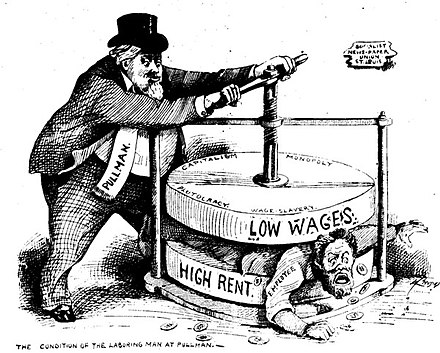Week 35: Labor’s Day
You can travel in style, but eventually you have to pay the bill.
History remembers George Pullman as the inventor of the railroad sleeping car which is synonymous with his name. It was the perfect idea for the time, when the American railroad system was exploding after the Civil War, making continental travel possible for just about everybody. The Pullman Car was literally a ‘hotel on wheels’ which offered fine dining, sleeping berths, and elegant washrooms for middle-class passengers, all serviced by Pullman Porters who attended to every need. The company provided jobs in skilled manufacturing and service to thousands of workers, including many former enslaved persons freed during the war.
Pullman’s idea was so good that he couldn’t keep up with demand. And so he invented the next noteworthy thing, something that today we recognize as a ‘company town.’ It was a huge factory outside Chicago, surrounded by housing for the workers, shopping areas, a recreation center, a library, and a church. Pullman was praised for his benevolence. But he also demanded absolutely fealty to the company, and outlawed independent newspapers, public speeches or open discussion. His workers lamented, “We are born in a Pullman house, fed from the Pullman shops, taught in the Pullman school, catechized in the Pullman Church, and when we die we shall go to the Pullman Hell.”
In the summer of 1894, Pullman’s reputation went off the rails. The country had gone into a deep recession, and Pullman cut the salaries of his workers 25% without lowering the rent they were forced to pay. In response, his entire workforce – 50,000 people who built and serviced Pullman cars nationwide – went on strike. This in turn threatened to shut down the country’s postal delivery system. In response, President Grover Cleveland sent in 12,000 federal troops to violently break the strike, a brutal move which left several workers dead.
The nation was shocked and appalled. The political damage to the President was severe. Facing an election in the fall, he needed a way to save face and repair his relations with the labor movement. Just six days after the strike ended, a bill passed unanimously through Congress, which Cleveland signed with much fanfare, declaring Sept. 3 a national day of rest. This date also had the benefit of NOT being on May 1, which was recognized by the International Workingmen’s Association and the International Communist Party as a day of strike and protest, which had culminated in the ‘Haymarket Affair,’ a riot and bombing in Chicago on May 5, 1886.
Cleveland’s ploy was ambitious, but it failed to achieve his objective, he was not re-elected. It was even worse for Pullman, who was forever branded as a greedy overlord. He was so reviled that, when he died three years later, he was laid to rest in a lead casket and buried under several tons of reinforced concrete to keep resentful workers from digging him up.
But, as such governmental things tend to do, the legislation lived on, and it outlasted both of them. And that’s why, while most of the world celebrates its workers on May Day, since 1894, here in the United States, the first Monday in September has been recognized as “laborer’s day.”
And so, no matter what you labor at, enjoy an extra day of rest. Don’t go desecrating the bodies of any greedy capitalists or former presidents. At least until they are dead.
